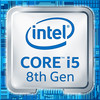Intel Core i5-9300HF vs Intel Core i7-4558U vs Intel Core i5-8300H
Intel Core i5-9300HF
► remove from comparison
Der Intel Core i5-9300HF ist ein Quad-Core-SoC für Notebooks, der auf der Coffee-Lake-Architektur (Refresh in 2019 CFL-HR) basiert. Er taktet die vier Prozessorkerne mit 2,4 - 4,1 GHz (Ein- und Zweikern Turbo) bzw. maximal 4 GHz wenn alle Kerne ausgelastet sind. Die Leistungsaufnahme ist mit 45 Watt TDP spezifiziert und kann wahrscheinlich vom Notebookhersteller auf 35 Watt heruntergesetzt werden (configurable TDP = cTDP Down). Im Vergleich zum Vorgänger dem Core i5-8300H wurde nur der Takt um 100 MHz erhöht, sonst gibt es keine Unterschiede.
Im Vergleich zum Core i5-9300H, ist die Grafikkarte im 9300HF deaktiviert und nicht verfügbar.
Die einzelnen Kerne haben sich bei Coffee Lake im Vergleich zu Kaby Lake nicht verändert. Die Leistung pro Takt bleibt also gleich und Coffee Lake kann nur durch die leicht verbesserte Fertigung (14nm++) und die zusätzlichen Kerne punkten. Auch die Grafikkarte wurde nicht verbessert, sondern lediglich teilweise höher getaktet.
Mit einem spezifizierten TDP von 45 Watt eignet sich der i5-9300HF am besten für große und schwere Notebooks, per "configurable TDP-down" kann die CPU auch mit 35 Watt betrieben werden, bei geringerer Leistung (Turbo wird nicht so lange gehalten).
Intel Core i7-4558U
► remove from comparison
Der Intel Core i7-4558U ist ein sparsamer Dual-Core-Prozessor auf Basis der Haswell-Architektur, der für den Einsatz in großen Ultrabooks vorgesehen ist. Dank Hyperthreading können die 2 Kerne gleichzeitig bis zu 4 Threads bearbeiten. Die in 22 Nanometer gefertigte CPU taktet mit 2,8 GHz, kann per Turbo Boost aber Frequenzen von bis zu 3,3 GHz erreichen (2 Kerne: 3,2 GHz).
Haswell ist der Nachfolger der 2012 vorgestellten Ivy-Bridge-Architektur und soll vor allem mit höherer Performance und verbesserter Energieeffizienz punkten. So wurde sowohl die Sprungvorhersage optimiert als auch die Zahl der Ausführungseinheiten erhöht, was insbesondere bei Verwendung von Hyper-Threading deutliche Leistungszuwächse verspricht. Neue Befehlssatzerweiterungen wie AVX2 und FMA sollen die Performance in darauf ausgelegten Anwendungen zusätzlich verbessern. Eine Besonderheit der ULV-Versionen ist die Integration des Chipsatzes auf das CPU-Package, um dadurch Leistungsaufnahme und Platzbedarf zu senken.
Die Performance des Core i7-4558U liegt entsprechend der gesteigerten Pro-MHz-Leistung in etwa auf dem Niveau des Ivy-Bridge-basierten Core i7-3540M mit etwas höherer Taktrate. Unter Einsatz der neuen Befehlssätze wie AVX2 kann die Leistung aber auch deutlich besser ausfallen. Damit stehen nicht nur für Office- und Multimedia-Zwecke, sondern auch für anspruchsvolle Anwendungen ausreichende Reserven zur Verfügung.
Für die Grafikausgabe zeigt sich die im Prozessor integrierte Intel Iris Graphics 5100 (40 EUs) verantwortlich, die mit 200 - 1200 MHz taktet. Diese verspricht ein deutliches Performanceplus gegenüber der HD Graphics 4000, was die Iris Graphics in Schlagdistanz zu einigen dedizierte Mittelklasse-Grafikkarten bringt.
Der Core i7-4558U liegt in der mit Haswell neu eingeführten TDP-Klasse von 28 Watt, die insbesondere für größere Ultrabooks im Format von 14 - 15 Zoll konzipiert wurde.
Intel Core i5-8300H
► remove from comparison
Der Intel Core i5-8300H ist ein Quad-Core-SoC für Notebooks, der auf der Coffee-Lake-Architektur basiert und Anfang 2018 vorgestellt wird. Er taktet die vier Prozessorkerne mit 2,3 - 4 GHz (Ein- und Zweikern Turbo) bzw maximal 3,9 GHz wenn alle Kerne ausgelastet sind. Die integrierte Grafikkarte hört auf den Namen UHD Graphics 630 und entspricht der alten HD Graphics 630. Die Leistungsaufnahme ist mit 45 Watt TDP spezifiziert und kann vom Notebookhersteller auf 35 Watt heruntergesetzt werden (configurable TDP = cTDP Down).
Die einzelnen Kerne haben sich bei Coffee Lake im Vergleich zu Kaby Lake nicht verändert. Die Leistung pro Takt bleibt also gleich und Coffee Lake kann nur durch die leicht verbesserte Fertigung (14nm++) und die zusätzlichen Kerne punkten. Auch die Grafikkarte wurde nicht verbessert, sondern lediglich teilweise höher getaktet.
Mit einem spezifizierten TDP von 45 Watt eignet sich der i5-8300H am besten für große und schwere Notebooks, per "configurable TDP-down" kann die CPU auch mit 35 Watt betrieben werden, bei geringerer Leistung (Turbo wird nicht so lange gehalten).
| Model | Intel Core i5-9300HF | Intel Core i7-4558U | Intel Core i5-8300H | ||||||||||||||||||||||||||||||||||||||||||||||||||||||||||||||||||||||||||||||||||||||||||||||||||||||||||||||||||||||||||||||||||||||||||||||||||||||||||||||||||||||||||||||||||||||||||||||||||||||||||||||||||||||||||||||||||||||||||||||||||||||||||||||||||||||||||||
| Series | Intel Coffee Lake | Intel Core i7 | Intel Coffee Lake | ||||||||||||||||||||||||||||||||||||||||||||||||||||||||||||||||||||||||||||||||||||||||||||||||||||||||||||||||||||||||||||||||||||||||||||||||||||||||||||||||||||||||||||||||||||||||||||||||||||||||||||||||||||||||||||||||||||||||||||||||||||||||||||||||||||||||||||
| Codename | Coffee Lake-H | Haswell | Coffee Lake-H | ||||||||||||||||||||||||||||||||||||||||||||||||||||||||||||||||||||||||||||||||||||||||||||||||||||||||||||||||||||||||||||||||||||||||||||||||||||||||||||||||||||||||||||||||||||||||||||||||||||||||||||||||||||||||||||||||||||||||||||||||||||||||||||||||||||||||||||
| Serie: Coffee Lake Coffee Lake-H |
|
|
| ||||||||||||||||||||||||||||||||||||||||||||||||||||||||||||||||||||||||||||||||||||||||||||||||||||||||||||||||||||||||||||||||||||||||||||||||||||||||||||||||||||||||||||||||||||||||||||||||||||||||||||||||||||||||||||||||||||||||||||||||||||||||||||||||||||||||||||
| Clock | 2400 - 4100 MHz | 2800 - 3300 MHz | 2300 - 4000 MHz | ||||||||||||||||||||||||||||||||||||||||||||||||||||||||||||||||||||||||||||||||||||||||||||||||||||||||||||||||||||||||||||||||||||||||||||||||||||||||||||||||||||||||||||||||||||||||||||||||||||||||||||||||||||||||||||||||||||||||||||||||||||||||||||||||||||||||||||
| L1 Cache | 256 KB | 128 KB | 256 KB | ||||||||||||||||||||||||||||||||||||||||||||||||||||||||||||||||||||||||||||||||||||||||||||||||||||||||||||||||||||||||||||||||||||||||||||||||||||||||||||||||||||||||||||||||||||||||||||||||||||||||||||||||||||||||||||||||||||||||||||||||||||||||||||||||||||||||||||
| L2 Cache | 1 MB | 512 KB | 1 MB | ||||||||||||||||||||||||||||||||||||||||||||||||||||||||||||||||||||||||||||||||||||||||||||||||||||||||||||||||||||||||||||||||||||||||||||||||||||||||||||||||||||||||||||||||||||||||||||||||||||||||||||||||||||||||||||||||||||||||||||||||||||||||||||||||||||||||||||
| L3 Cache | 8 MB | 4 MB | 8 MB | ||||||||||||||||||||||||||||||||||||||||||||||||||||||||||||||||||||||||||||||||||||||||||||||||||||||||||||||||||||||||||||||||||||||||||||||||||||||||||||||||||||||||||||||||||||||||||||||||||||||||||||||||||||||||||||||||||||||||||||||||||||||||||||||||||||||||||||
| Cores / Threads | 4 / 8 | 2 / 4 | 4 / 8 | ||||||||||||||||||||||||||||||||||||||||||||||||||||||||||||||||||||||||||||||||||||||||||||||||||||||||||||||||||||||||||||||||||||||||||||||||||||||||||||||||||||||||||||||||||||||||||||||||||||||||||||||||||||||||||||||||||||||||||||||||||||||||||||||||||||||||||||
| TDP | 45 Watt | 28 Watt | 45 Watt | ||||||||||||||||||||||||||||||||||||||||||||||||||||||||||||||||||||||||||||||||||||||||||||||||||||||||||||||||||||||||||||||||||||||||||||||||||||||||||||||||||||||||||||||||||||||||||||||||||||||||||||||||||||||||||||||||||||||||||||||||||||||||||||||||||||||||||||
| Technology | 14 nm | 22 nm | 14 nm | ||||||||||||||||||||||||||||||||||||||||||||||||||||||||||||||||||||||||||||||||||||||||||||||||||||||||||||||||||||||||||||||||||||||||||||||||||||||||||||||||||||||||||||||||||||||||||||||||||||||||||||||||||||||||||||||||||||||||||||||||||||||||||||||||||||||||||||
| max. Temp. | 100 °C | 100 °C | 100 °C | ||||||||||||||||||||||||||||||||||||||||||||||||||||||||||||||||||||||||||||||||||||||||||||||||||||||||||||||||||||||||||||||||||||||||||||||||||||||||||||||||||||||||||||||||||||||||||||||||||||||||||||||||||||||||||||||||||||||||||||||||||||||||||||||||||||||||||||
| Socket | FCBGA1440 | FCBGA | FCBGA1440 | ||||||||||||||||||||||||||||||||||||||||||||||||||||||||||||||||||||||||||||||||||||||||||||||||||||||||||||||||||||||||||||||||||||||||||||||||||||||||||||||||||||||||||||||||||||||||||||||||||||||||||||||||||||||||||||||||||||||||||||||||||||||||||||||||||||||||||||
| Features | Dual-Channel DDR4 Memory Controller, HyperThreading, AVX, AVX2, Quick Sync, Virtualization, AES-NI | Iris Graphics 5100 (200 - 1200 MHz), DDR3(L)-1600 Memory Controller, HyperThreading, AVX, AVX2, Quick Sync, Virtualization, AES-NI | Dual-Channel DDR4 Memory Controller, HyperThreading, AVX, AVX2, Quick Sync, Virtualization, AES-NI | ||||||||||||||||||||||||||||||||||||||||||||||||||||||||||||||||||||||||||||||||||||||||||||||||||||||||||||||||||||||||||||||||||||||||||||||||||||||||||||||||||||||||||||||||||||||||||||||||||||||||||||||||||||||||||||||||||||||||||||||||||||||||||||||||||||||||||||
| Architecture | x86 | x86 | x86 | ||||||||||||||||||||||||||||||||||||||||||||||||||||||||||||||||||||||||||||||||||||||||||||||||||||||||||||||||||||||||||||||||||||||||||||||||||||||||||||||||||||||||||||||||||||||||||||||||||||||||||||||||||||||||||||||||||||||||||||||||||||||||||||||||||||||||||||
| $250 U.S. | $454 U.S. | $250 U.S. | |||||||||||||||||||||||||||||||||||||||||||||||||||||||||||||||||||||||||||||||||||||||||||||||||||||||||||||||||||||||||||||||||||||||||||||||||||||||||||||||||||||||||||||||||||||||||||||||||||||||||||||||||||||||||||||||||||||||||||||||||||||||||||||||||||||||||||||
| Announced | |||||||||||||||||||||||||||||||||||||||||||||||||||||||||||||||||||||||||||||||||||||||||||||||||||||||||||||||||||||||||||||||||||||||||||||||||||||||||||||||||||||||||||||||||||||||||||||||||||||||||||||||||||||||||||||||||||||||||||||||||||||||||||||||||||||||||||||||
| Manufacturer | ark.intel.com | ark.intel.com | ark.intel.com | ||||||||||||||||||||||||||||||||||||||||||||||||||||||||||||||||||||||||||||||||||||||||||||||||||||||||||||||||||||||||||||||||||||||||||||||||||||||||||||||||||||||||||||||||||||||||||||||||||||||||||||||||||||||||||||||||||||||||||||||||||||||||||||||||||||||||||||
| Transistors | 1300 Million | ||||||||||||||||||||||||||||||||||||||||||||||||||||||||||||||||||||||||||||||||||||||||||||||||||||||||||||||||||||||||||||||||||||||||||||||||||||||||||||||||||||||||||||||||||||||||||||||||||||||||||||||||||||||||||||||||||||||||||||||||||||||||||||||||||||||||||||||
| Die Size | 181 mm2 | ||||||||||||||||||||||||||||||||||||||||||||||||||||||||||||||||||||||||||||||||||||||||||||||||||||||||||||||||||||||||||||||||||||||||||||||||||||||||||||||||||||||||||||||||||||||||||||||||||||||||||||||||||||||||||||||||||||||||||||||||||||||||||||||||||||||||||||||
| iGPU | Intel Iris Graphics 5100 (200 - 1200 MHz) | Intel UHD Graphics 630 (350 - 1000 MHz) |


 Deutsch
Deutsch English
English Español
Español Français
Français Italiano
Italiano Nederlands
Nederlands Polski
Polski Português
Português Русский
Русский Türkçe
Türkçe Svenska
Svenska Chinese
Chinese Magyar
Magyar
